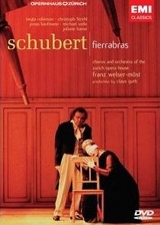|
 There
is no greater name in lieder composition than that of Franz Schubert, and he
desperately wanted to make a name for himself as a composer of opera as
well. However, his operatic efforts met only with indifference or outright
failure in his lifetime - as so much of his great body of work did. After
his death, much of his chamber, symphonic, and lieder works achieved
masterpiece status, whereas his theatrical works remain obscure. There
is no greater name in lieder composition than that of Franz Schubert, and he
desperately wanted to make a name for himself as a composer of opera as
well. However, his operatic efforts met only with indifference or outright
failure in his lifetime - as so much of his great body of work did. After
his death, much of his chamber, symphonic, and lieder works achieved
masterpiece status, whereas his theatrical works remain obscure.
In late 2005 the Zurich Opera House chose Claus Guth to stage Schubert’s
setting of a libretto by Josef Kupelwieser, Fierrabras. Not only did
Schubert never see this opera staged, but Richard Lawrence attests, in his
abbreviated but informative booklet note, that the work remained unstaged
until 1988. Lawrence attempts a brief synopsis of the plot, but neither the
discs themselves nor the booklet have any kind of detailed synopsis, and
truthfully, watching this very long opera, particularly in Guth’s abstract,
uni-set staging, does little to communicate the narrative. Suffice it to
say, we are in, as Lawrence writes, “a medieval never-never land,” and
heroes suffer, their lovers suffer, the chorus suffers, until a joyful
conclusion does what it can to erase the memory of all that suffering.
A libretto as hopeless as this gives a creative director a lot of room for
innovative staging. Guth builds his production around a Schubert lookalike,
both observing and sometimes interacting with the principals, with the drama
played out in a parlor setting. Presumably that is Schubert’s piano for
composition dangling from the ceiling. Dress is contemporaneous with
Schubert’s era. Guth and set/costume designer Christian Schmidt manage to
keep the stage picture varied and active, but in foregoing any sense of
naturalistic action, the relationships and plot points get lost. The result
is an elaborate concert presentation. At 171 minutes spread over two discs,
it’s a long show, and some viewers may feel impatience with the static
narrative and Guth’s stylization. The attenuated curtain calls suggest as
much even for the live audience. As with his score to Alfonso und Estrella,
Schubert’s melodic gift doesn’t reach the heights of his greatest pieces in
Fierrabras, but the music is consistently appealing and often quite
imaginative. Franz Welser-Möst emphasizes the drama of the score, perhaps
trying to supply more excitement than the libretto manages to deliver. A
little more variety of texture could be desired, but the Zurich Opera House
forces play the score with expert authority.
Fans of rising tenor Jonas Kaufmann should not get too excited to see his
name in the title role, as the character of Fierrabras disappears for much
of the action, especially in the latter half of the opera. Nonetheless, his
handsome presence and warm delivery give evidence of his appeal. Twyla
Robinson and Juliane Banse both have to bewail their fates at extended
length, with Robinson managing to do so with a more interesting voice of
considerable size. Michael Volle as the Roland of legend and Christoph
Strehl partner their ladies well. Lászlo Polgár strides the stage as the
King, sometimes clambering onto an oversize chair as his throne. His voice
provides sufficient regal command.
EMI Classics bare-bones packaging omits any track listing or information
beyond the Lawrence essay and the usual “back cover” credits. Anyone who has
gone begging for a DVD of Fierrabras, however, can’t be a chooser. This
well-sung set, with take-it-or-leave-it direction, will have to do.
|